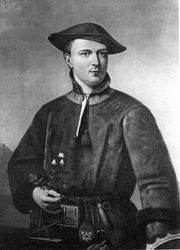mið. 23.5.2007
Carl Linnaeus 300 ára
 Í dag eru 300 ár síðan Carl Linnaeus fæddist í Svíþjóð. Þó það þekki kannski ekki allir til Linnaeus finnst mér samt við hæfi að minnast hans, því Linnaeus fann upp það flokkunarkerfi sem við notum enn þann dag í dag til þess að flokka allar lífverur. Kerfið setti Linnaeus fyrst fram í smáriti, 14 blaðsíðna löngu, sem bar titilinn Systema Naturae. Hann var aðeins 28 ára að aldri.
Í dag eru 300 ár síðan Carl Linnaeus fæddist í Svíþjóð. Þó það þekki kannski ekki allir til Linnaeus finnst mér samt við hæfi að minnast hans, því Linnaeus fann upp það flokkunarkerfi sem við notum enn þann dag í dag til þess að flokka allar lífverur. Kerfið setti Linnaeus fyrst fram í smáriti, 14 blaðsíðna löngu, sem bar titilinn Systema Naturae. Hann var aðeins 28 ára að aldri.
Afrek Linnaeus er ekki lítið, því hann bjó til lógískt kerfi til þess að flokka alla náttúruna á samræmdan og kerfisbundinn máta. Þegar allt kemur til alls er þetta nefnilega grundvallarhugmynd alls vísinda og fræðastarfs: Að skilja veröldina í kringum okkur, gefa hlutum nöfn og skilgreina samband þeirra við hvorn annan. Og fyrsta skrefið í þekkingarleit er alltaf flokkun: Hvað er eins og hvað annað? Og hvaða einkenni réttlæta að flokka fyrirbæri saman? Gildir þá einu hvort það eru skordýr eða skjöl.
Dr Matthew Cobb skrifar skemmtilega grein um Linnaeus í LA Times í morgun:
Linnaeus proposed a hierarchical scheme in which each organism could be described in terms of its kingdom, class, order, genus and species — from the broadest category to the narrowest. By using Latin — the common scientific language of the time — Linnaeus was able to bypass the myriad folk names for animals and plants that made comparison of information from one country to another so difficult. He also integrated the growing conviction that like bred like, putting species at the heart of the natural world.
Above all, Linnaeus argued that organisms should be classified on the basis of a small number of physical characteristics rather than, say, their habits (this animal flies, that one swims) or their use (these plants can be eaten, those are good for medicine). In the case of plants, Linnaeus used their sexual organs to distinguish one species from another. This not only led to a more effective classification, it also inadvertently provided 18th and 19th century ladies with a discreet way of initiating themselves in the facts of life. ...Curiously, the content of the book was as dry as this description suggests — there were no glorious prints identifying wild and wonderful creatures; it was simply a list of names.
But its simplicity was what made it so successful. "Systema Naturae" was effectively an index to all those books that did have marvelous pictures of animals and plants. Linnaeus provided natural historians with a way to compare and integrate all previous knowledge and to build on that knowledge when new, bizarre animals, such as the duckbilled platypus, were discovered.
Linnaeus' objective was to reveal the order in God's creation. Contemporary scientists use Linnaeus' system to understand something that would have been deeply shocking to the young Swede: how species have evolved. ...Humans have an obsession with classification and connections — hence the perpetual reorganizing of Linnaeus' system that has gone on over the last 270 years. But the only groupings that have any biological meaning are species and individuals. Kingdoms, phyla, genera and all the other categories beloved by Linnaeus' descendants are merely a description of the pattern we think evolution followed, rather than something linking organisms in today's world. The only thing that links lions and humans as mammals is that we have a common ancestor somewhere deep in the evolutionary past.
The magic of evolution is that the massive differences that exist between the organisms we can now see on the planet — between bacteria and humans, between dogs and snakes — all began with tiny changes, as one individual showed a slight advantage over another. Over the immense expanse of geological time, amplified by the power of natural selection, these tiny differences gradually led to the myriad varied life-forms we see today.
Where Linnaeus saw order and logic, we now see a dynamic endless process, and certainly no insight into the mind of God. That is the fate of many influential discoveries — they become important not for what their discoverer intended but for what we can do with them. On his 300th birthday, Linnaeus would no doubt be surprised, but proud, of the use we make of his system of classification.
M


Bæta við athugasemd [Innskráning]
Ekki er lengur hægt að skrifa athugasemdir við færsluna, þar sem tímamörk á athugasemdir eru liðin.